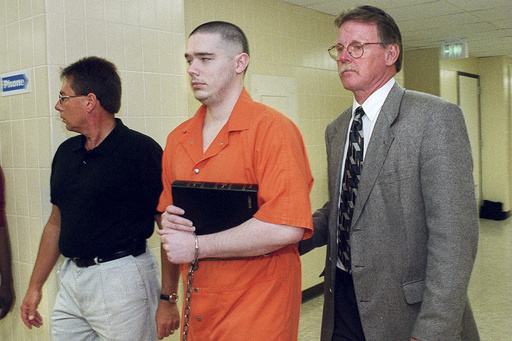The Indiana Supreme Court has refused to halt the execution of a man convicted of murdering his brother along with three others.
In an order released on Thursday, the court dismissed requests from Joseph Corcoran’s defense team to present arguments regarding whether his impending execution scheduled for December 18 infringes on his constitutional rights and questioned his competency to face execution.
The court indicated that a detailed written opinion regarding its decision would be forthcoming. If carried out, this execution would mark Indiana’s first execution by the state in 15 years.
Joseph Corcoran, 49, was found guilty in July 1997 for the murder of four individuals, including his brother, James Corcoran, as well as Douglas A. Stillwell, Robert Scott Turner, and Timothy Bricker, who were all fatally shot.
Since 1999, Corcoran has been on death row, with his appeals process coming to an end in 2016. He contended that executing him would be unconstitutional due to his mental illness and claimed that the state had not adequately revealed its execution protocol.
In a handwritten statement submitted last month to the state Supreme Court, Corcoran expressed a desire to cease all legal proceedings regarding his case.
“I am guilty of the crime I was convicted of, and accept the findings of all the appellate courts,” he stated.
He further noted, “The long drawn out appeal history has addressed all the issues I wished to appeal, such as the issue of competency. I do not wish to proceed with more and/or endless litigation.”
Corcoran acknowledged the consequences of the court’s decision, stating, “I understand that if this Court rejects my counsel’s petition, the death warrant will be carried out. I will then be put to death for the heinous crime I committed.”
Joanna Green, a public defender for Corcoran, mentioned that during the time of the 1997 shootings in Fort Wayne, his “mental illness was percolating.”
She described that at the time of the incident, he had isolated himself in a soundproofed room displaying behaviors consistent with paranoia, believing others were discussing him.
Armed with multiple guns, Corcoran went downstairs and shot the men intending to intimidate them.
After the shooting, he reportedly laid down his weapon and asked neighbors to call 911 before waiting on his front steps for police to arrive.
Green expressed disappointment with the Supreme Court’s ruling and insisted on pursuing the case in federal court to seek a stay of execution.
“We haven’t had an execution in Indiana for 15 years. Mr. Corcoran is seriously mentally ill,” she commented.
She voiced hope that Indiana would not follow the path of other states that execute individuals with severe mental health issues, further noting that part of his mental condition is that it often goes unnoticed.
Corcoran’s legal team submitted a filing stating that he has severe paranoid schizophrenia, which they argue impairs his ability to comprehend that the state intends to execute him.
They contended that “the manifestations of that schizophrenia prevent him from rationally understanding that the State intends to execute him because a jury found him guilty of murder,” asserting that executing him would neither deter crime nor serve justice, but instead would amount to unconstitutionally cruel punishment.
Larry Komp, another public defender representing Corcoran, characterized the recent ruling as a narrow decision.
“There is a lot of evidence that he is incompetent,” Komp stated in an interview.
Meanwhile, the Indiana Attorney General’s office confirmed that Corcoran’s execution is still set to proceed as planned.
Indiana has not executed anyone since 2009, marking this as a significant moment in the state’s history according to the Death Penalty Information Center.
The long halt in executions has been largely due to difficulties in obtaining the drugs used for lethal injections.
Earlier this year, Governor Eric Holcomb announced that the state’s Department of Correction had secured the sedative pentobarbital, used in executions by several other states, and sought the Supreme Court to establish a date for Corcoran’s execution.
